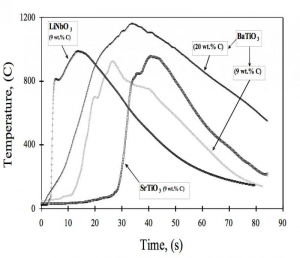
We developed a simple, economical and energy efficient synthesis of submicron and nanostructured complex oxides particles from inexpensive reactant mixtures referred to as Carbon Combustion Synthesis of Oxides (CCSO). In this process, the exothermic oxidation of carbon (~395 kJ/mol) generates a sharp thermal reaction wave (slope of up to 500 °C/cm) that propagates at a velocity of 0.1-3 mm/s through the solid reactant mixture (oxides, carbonates or nitrates) converting it to the desired product.
We used this new process to synthesize numerous oxide powders such as ferroelectrics (BaTiO3, SrTiO3, LiNbO3), multiferroics (HoMnO3, BiFeO3), fuel cell component (LaGaO3, La0.6Sr0.4MnO3), rechargeable battery electrode materials (LiCoO2, LiMn2O4), hard/soft magnetic composites (BaFe12O19, CoFe2O4, Ni-Zn, Mn-Zn-ferrites, Y3Fe5O12), superconductors (Y123), diesel emission removal catalysts (LaCrO3, LiCrO3) and others. An important feature of CCSO is the extensive emission of CO2. The associated convective cooling of the sample decreases the local temperature and prevents product partial melting and sintering. Thus, it enables synthesis of highly porous (~70%) powders having a particle size in the range of 50-800 nm with a surface area ~10 m2/g. XRD-pattern, EDX, and Raman Spectroscopy of the as-synthesized products indicated that well crystalline single-phase particles were formed by the process. The (magnetic/dielectric) product properties are usually superior to those produced by other synthesis processes and are produced at a lower price.
The main advantages of CCSO technology are (i) It does not consume energy and circumvents the use of a high temperature furnace; (ii) Synthesis uses inexpensive raw materials, (oxides, carbonates, soot); (iii) The synthesis is completed in a very short time (order of seconds); (iv) The process is simple and the same reactor can be used to synthesize various oxides.
The University of Houston has filed US patent application for CCSO technology and is seeking a partner to proceed with the commercialization of this technology.